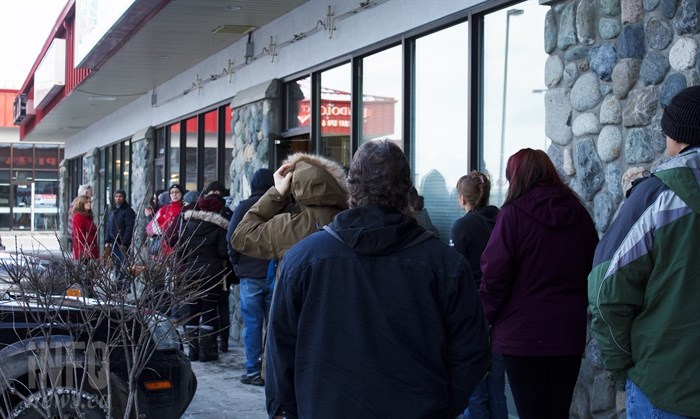
At least 25 people had put their name on the list for a visit at the Summit Medical Clinic before it opened in this winter, 2017 photo.
(ASHLEY LEGASSIC / iNFOnews.ca)
May 02, 2017 - 6:30 PM
THOMPSON-OKANAGAN - Across the Interior, access to health care was an election issue long before the campaigns began and it's no longer just about finding family doctors; for many people it has become a struggle finding walk-in clinics that in part replaced the family doctors.
Nowhere is the issue more prevalent than in Kamloops. It's always been hard to find doctors in the Tournament Capital but has gotten steadily worse. The sole walk-in clinic on Kamloops' North Shore stopped seeing walk-in patients earlier this year. At the remaining clinics, you'll typically find patients lining up two hours before it opens hoping to booking a time to see a doctor. A simple prescription renewal can sometimes require an entire day off work.
Kamloops-South Thompson NDP candidate Nancy Bepple estimates 30,000 people are in this situation while B.C. Liberal rival Peter Milobar says the number is closer to 17,000.
Kamloops is not alone, either. Walk in clinics have closed in Kelowna and Vernon within the past year, leaving residents without general practitioners fewer options for primary care services.
In Vernon, two walk-in clinics announced closures within one year of each other. One clinic said it had to close, as the sole physician there couldn't take the strain.
In Kelowna, two walk-in clinics closed within six months of each other, leaving just five clinics left in the city.
The family doctor shortage and lack of access to primary care has become a heated issue for this year's provincial election and all parties have proposed their own answers.
The B.C. NDP's platform makes access to family doctors a top priority. The party promises to develop a "new urgent care model" which would aim to speed up health care support for emergency room patients, along with helping residents living in rural B.C. with an improved medical travel allowance. The party would also implement coordination across the province to manage and monitor waitlists.
They also promise to establish urgent care centres across the province, which would be open during evenings and weekends, along with investing in new hospitals and health care facilities as well as home care and long term care for seniors. Part of their platform includes lowering the costs of prescription drugs and medications.
The B.C. Liberals have addressed the family doctor shortage this past year, acknowledging that Kamloops is further down the hole than other areas in B.C. The government introduced primary care centres to Kamloops' North Shore earlier this year and promised to recruit more family doctors.
Their platform acknowledges recruitment and retention of family doctors is difficult, so they want to grow them at home. Their goal is to find 400 doctors through school by 2025. The party also plans to fund the training of an additional 500 nurses per year across B.C. by 2022, along with training 100 more nurse practitioners.
The party also plans on retaining newly trained health care professionals in northern and rural communities, expanding their current program to fast-track international doctors to B.C.'s rural communities, and invest more than $91 million into ambulance response times and supports for paramedics and dispatchers.
The B.C. Green Party's platform makes prevention and primary care the top priority. The party would incentivize becoming a general practitioner, improve efficiency and reduce administration by consulting with physicians and stakeholders.
The Greens say they would increase access to primary care to prevent small health issues from becoming large problems. The party says it would remove barriers to accessing care so they can get care faster.
The party would allocate $100 million to expanding resources for specialized health care workers such as nurse practitioners, physiotherapists and midwives. They also plan to have an essential drugs program proposal by 2019 in order to cut prescription drug costs.
To contact a reporter for this story, email Ashley Legassic or call 250-319-7494 or email the editor. You can also submit photos, videos or news tips to the newsroom and be entered to win a monthly prize draw.
We welcome your comments and opinions on our stories but play nice. We won't censor or delete comments unless they contain off-topic statements or links, unnecessary vulgarity, false facts, spam or obviously fake profiles. If you have any concerns about what you see in comments, email the editor in the link above.
News from © iNFOnews, 2017